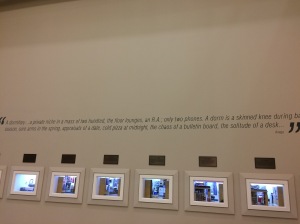Today's dot is written by Erika Betz from Hilbert College's Leadership Applications class:
How many people truly know all their coworker’s names or a little bit about them? I know for me, remembering names is difficult.
Recently, I observed the owner of my workplace demonstrate a leadership skill by taking the extra time to remember the interactions he has throughout the day. With the company growing at a fast pace, there are always new hires joining our team, so I always wondered how the owner remembers all 300 employees, even when he does not interact with them everyday.
When I asked him, he shared his secret. To maintain close, long lasting relationships with his employees, customers, and anyone that has an impact on his day, he uses his Notes app on his iPhone. There he types the correct spelling of a person’s name and details about their last conversation (e.g. person’s characteristics, family news or personal interests) to refer back to for the future.
It reminded me of Dale Carnegie’s Principles for Enhancing Relationships, which principle #6 stated: “a person’s name is to that person, the sweetest, most important sound in any language.” He went to say that “respect and acceptance stem from simple acts, such as remembering a person’s name and using it whenever appropriate instead of the often-overused Hey!” Carnegie developed LIRA, his own secret to remember names, which represents Look and Listen, Impression, Repetition and Association.
Think about how you felt when someone remembered your name or a detailed part of your life that you did not think was important to others. Whether you take notes, use the LIRA strategy, or create your own name game, how can you strengthen the skill to remember the names of those you encounter? Doing so will surely enhance your relationships and make them more meaningful.

















